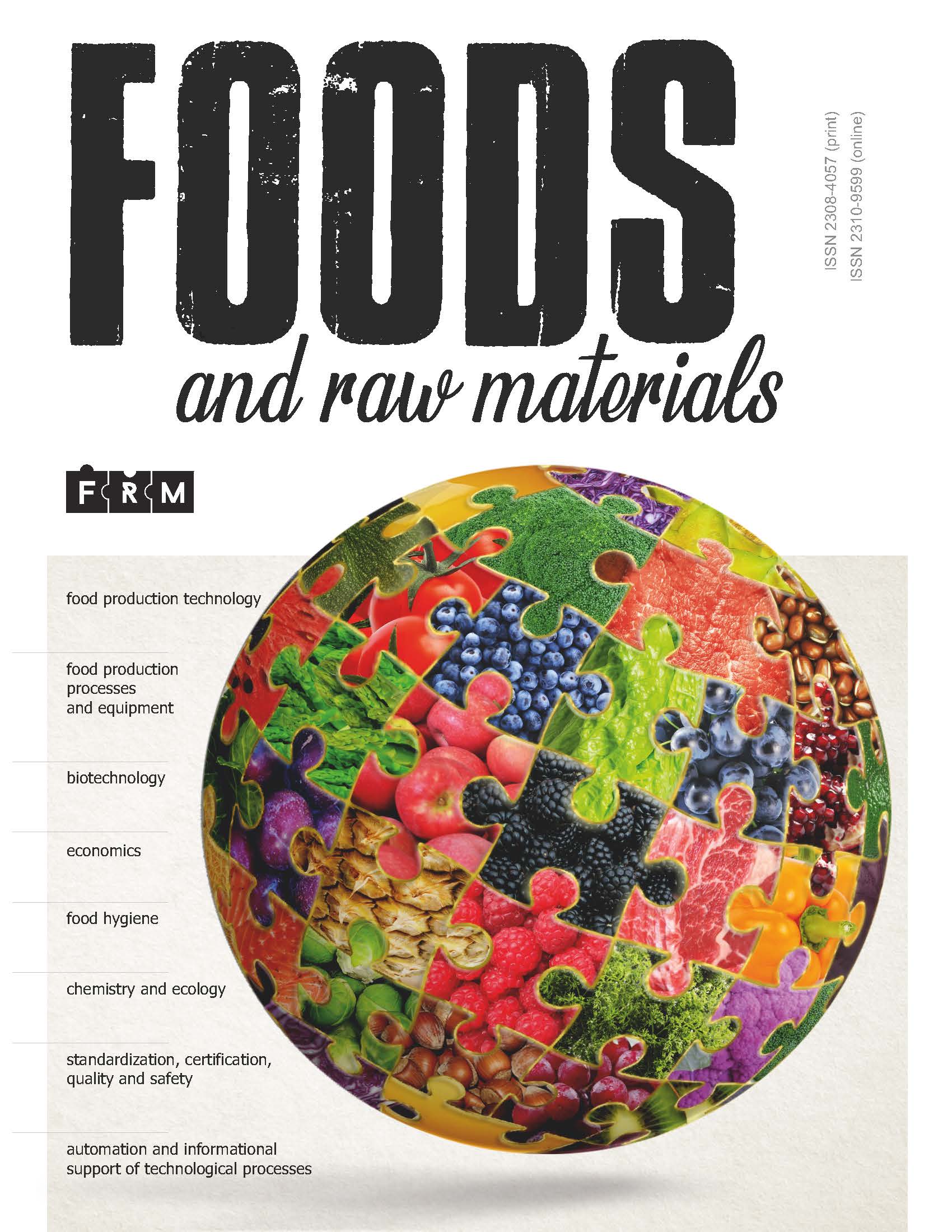Krasnodar, Россия
Krasnodar, Краснодарский край, Россия
Krasnodar, Краснодарский край, Россия
Krasnodar, Краснодарский край, Россия
Krasnodar, Краснодарский край, Россия
Krasnodar, Краснодарский край, Россия
The increasing production volumes of soy foods require new express methods for testing soybeans during processing and presowing. This study assessed the efficiency of spectral pre-sowing assessment methods using Vilana soybeans. The research featured soybeans of the Vilana cultivar. The control sample consisted of untreated whole soybeans while the test samples included soybeans pretreated with various modifiers. The methods involved spectrofluorimetry and IR-Fourier spectrometry. A wide emission band at 400–550 nm corresponded to the fluorescence of the soybean testa. The band at 560–610 nm indicated the presence of such modifiers as Imidor insecticide and Deposit fungicide. The luminescence spectrum of the untreated soybean testa was maximal at 441 nm. The luminescence spectrum of the treated soybean samples was maximal at 446.5 and 585 nm when the excitation wavelength was 362 nm. The fluorescence was studied both spectrally and kinetically to establish the maximal luminescence time and the typical vibration frequencies. The spectral studies of Vilana soybeans before and after treatment revealed which modifiers were adsorbed on the palisade epidermis and defined the type of interaction between the modifier and the soybean. The spectrofluorimetry and IR spectroscopy proved able to provide a reliable qualitative and quantitative analysis of Vilana soybean surface.
Soybeans, Vilana variety, fluorescence, spectroscopy, kinetics, adsorption, chromophore groups, phytochromes, cryptochromes, photoreceptors
1. Messina M. Perspective: Soybeans can help address the caloric and protein needs of a growing global population. Frontiers in Nutrition. 2022;9. https://doi.org/10.3389/fnut.2022.909464
2. Abdelghany AM, Zhang S, Azam M, Shaibu AS, Feng Y, Qi J, et al. Natural variation in fatty acid composition of diverse world soybean germplasms grown in China. Agronomy. 2020;10(1). https://doi.org/10.3390/agronomy10010024
3. Sokolov DV, Bolkhonov BA, Zhamsaranova SD, Lebedeva SN, Bazhenova BA. Enzymatic hydrolysis of soy protein. Food Processing: Techniques and Technology. 2023;53(1):86-96. (In Russ.). https://doi.org/10.21603/2074-9414-2023-1-2418
4. Serba EM, Tadzhibova PYu, Rimareva LV, Overchenko МB, Ignatova NI, Volkova GS. Bioconversion of soy under the influence of Aspergillus oryzae strains producing hydrolytic enzymes. Foods and Raw Materials. 2021;9(1):52-58. https://doi.org/10.21603/2308-4057-2021-1-52-58
5. Zhang J, Li M, Kong Z, Bai T, Quan R, Gao T, et al. Model prediction of herbicide residues in soybean oil: Relationship between physicochemical properties and processing factors. Food Chemistry. 2022;370. https://doi.org/10.1016/j.foodchem.2021.131363
6. Zelentsov SV, Kochegura AV, Podkina DV, Trembak EN. Vilana Soybeans. Russia patent 03379607722. 1996.
7. Migues VH, David JM, Gomes AF, David JP. Determination of soybean isoflavone by HPLC/DAD and simple UV spectroscopic analysis: A comparative study. Food Analytical Methods. 2022;15:367-376. https://doi.org/10.1007/s12161-021-02120-2
8. Desta KT, Hur O, Lee S, Yoon H, Shin M, Yi J, et al. Origin and seed coat color differently affect the concentrations of metabolites and antioxidant activities in soybean (Glycine max (L.) Merrill) seeds. Food Chemistry. 2022;381. https://doi.org/10.1016/j.foodchem.2022.132249.
9. Saito Y, Itakura K, Kuramoto M, Kaho T, Ohtake N, Hasegawa H, et al. Prediction of protein and oil contents in soybeans using fluorescence excitation emission matrix. Food Chemistry. 2021;365. https://doi.org/10.1016/j.foodchem.2021.130403
10. Yu D, Lord N, Polk J, Dhakal K, Li S, Yin Y, et al. Physical and chemical properties of edamame during bean development and application of spectroscopy-based machine learning methods to predict optimal harvest time. Food Chemistry. 2022;368. https://doi.org/10.1016/j.foodchem.2021.130799
11. Belyakov MV. Determination of seed germination of plants by the luminescence method. The Bulletin of Izhevsk State Agricultural Academy. 2017;52(3):35-40. (In Russ.). https://elibrary.ru/ZRCNHZ
12. Belyakov MV, Bereznikova LA. Innovative photoluminescent device control parameters of the plant seeds. Bulletin NGIEI. 2017;78(11):46-58. (In Russ.). https://elibrary.ru/ZWPRFF
13. Efimenko EG, Kucherenko LA, Efimenko SK, Nagalevskaya YaA. Evaluation of the general qualitative traits of soybean seeds using IR-spectrometry. Oilseeds. Scientific and Technical Bulletin of the All-Russian Scientific Research Institute of Oilseed. 2016;167(3):33-38. (In Russ.). https://elibrary.ru/WWTJJD
14. Valand R, Tanna S, Lawson G, Bengtström L. A review of Fourier Transform Infrared (FTIR) spectroscopy used in food adulteration and authenticity investigations. Food Additives and Contaminants: Part A. 2020;37(1):19-38. https://doi.org/10.1080/19440049.2019.1675909
15. Romero EL, Fairfax M, Colombo R, Gallup C, Biro A. Fungicide compounds and mixtures for control of fungal diseases of grain crops. Russia patent RU 2749224C2. 2021.
16. Tanaka A, Shimomura M, Nokura Y, Murakami S. Heterocyclic compound and agent containing it for the control of harmful arthropods. Russia patent RU 2748695C2. 2021.
17. Denisov A. Rhizoform for soybean seed processing. International Agricultural Journal. 2015;(2):65-67. (In Russ.). https://elibrary.ru/TOASQH
18. Anhalt JC, Moorman TB, Koskinen WC. Biodegradation of imidacloprid by an isolated soil microorganism. Journal of Environmental Science and Health, Part B: Pesticides, Food Contaminants, and Agricultural Wastes. 2007;42(5):509-514. https://doi.org/10.1080/03601230701391401 PMID: 17562458.
19. Belyakov MV. Technique of studying the luminescent properties of plant seeds in “Flyuorat-02-Panorama” spectrofluorometer. Scientific Life. 2016;(3):18-26. (In Russ.). https://elibrary.ru/VXMTLN
20. Liu Q, Zhang W, Zhang B, Du C, Wei N, Liang D, et al. Determination of total protein and wet gluten in wheat flour by Fourier transform infrared photoacoustic spectroscopy with multivariate analysis. Journal of Food Composition and Analysis. 2022;106. https://doi.org/10.1016/j.jfca.2021.104349
21. Kazachenko AlS, Kazachenko AS, Chaplygina IA, Stupko TV. Using IR-spectroscopy in the analysis of grain (review). Bulletin of KSAU. 2019;150(9):134-142. (In Russ.). https://elibrary.ru/COSTFD
22. Keerati-U-Rai M, Miriani M, Iametti S, Bonomi F, Corredig M. Structural changes of soy proteins at the oil-water interface studied by fluorescence spectroscopy. Colloids and Surfaces B: Biointerfaces. 2012;93:41-48. DOI: https://doi.org/10.1016/j.colsurfb.2011.12.002
23. Marshall WE, Wartelle LH, Boler DE, Johns MM, Toles CA. Enhanced metal adsorption by soybean hulls modified with citric acid. Bioresource Technology. 1999;69(3):263-268. https://doi.org/10.1016/S0960-8524(98)00185-0
24. Li W, Zhao H, He Z, Zeng M, Qin F, Chen J. Modification of soy protein hydrolysates by Maillard reaction: Effects of carbohydrate chain length on structural and Interfacial properties. Colloids and Surfaces B: Biointerfaces. 2016;138:70-77. https://doi.org/10.1016/j.colsurfb.2015.11.038











